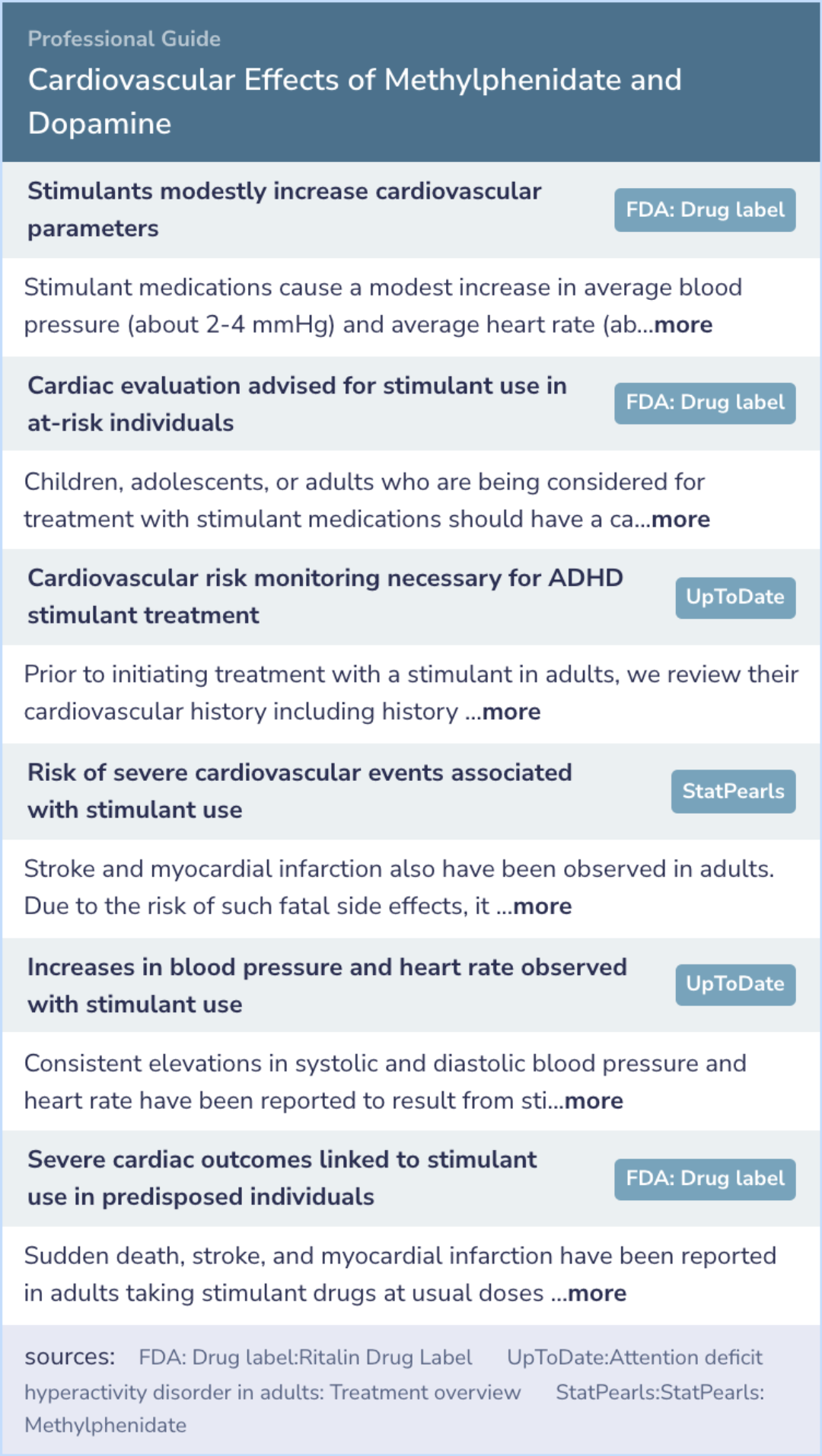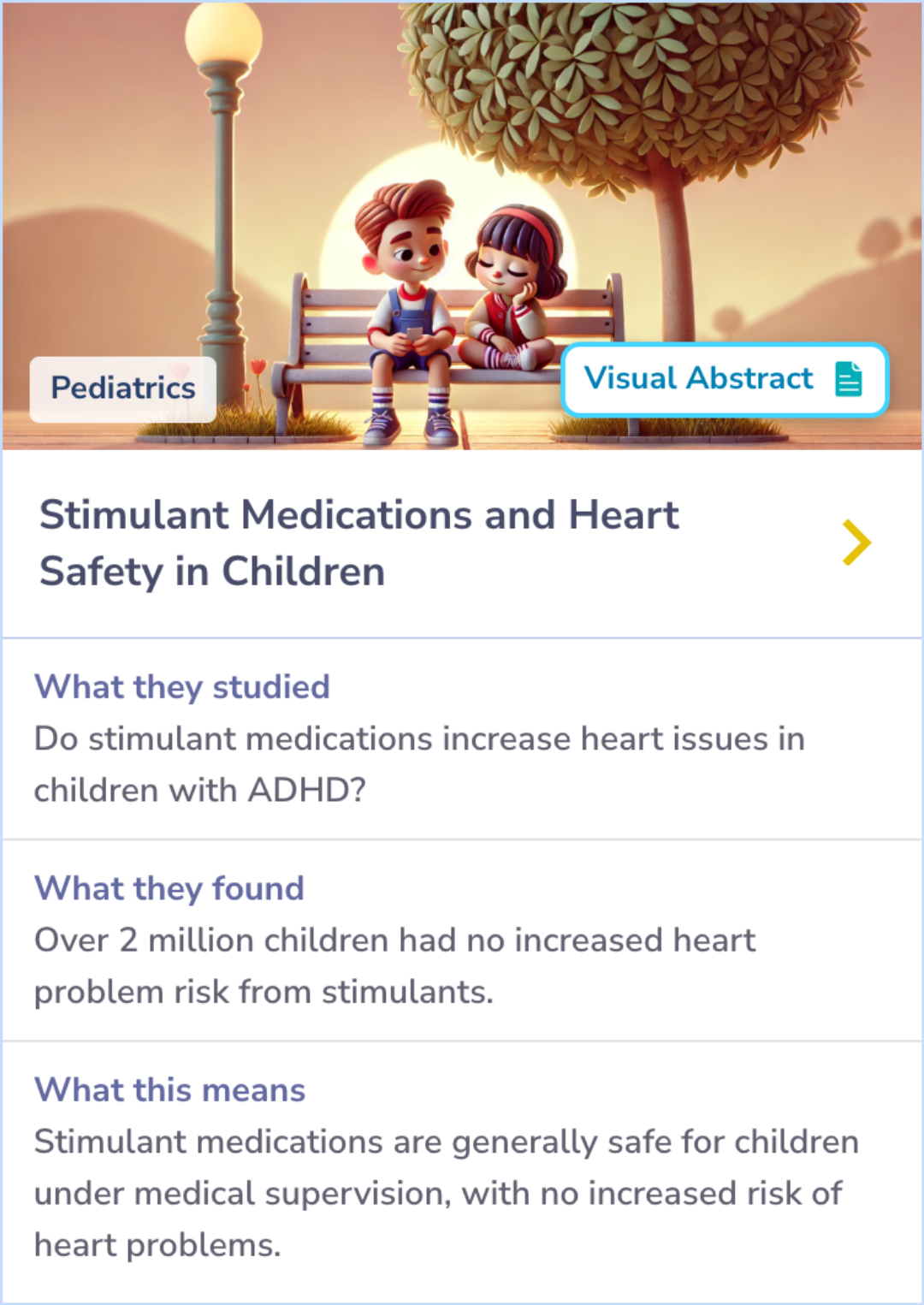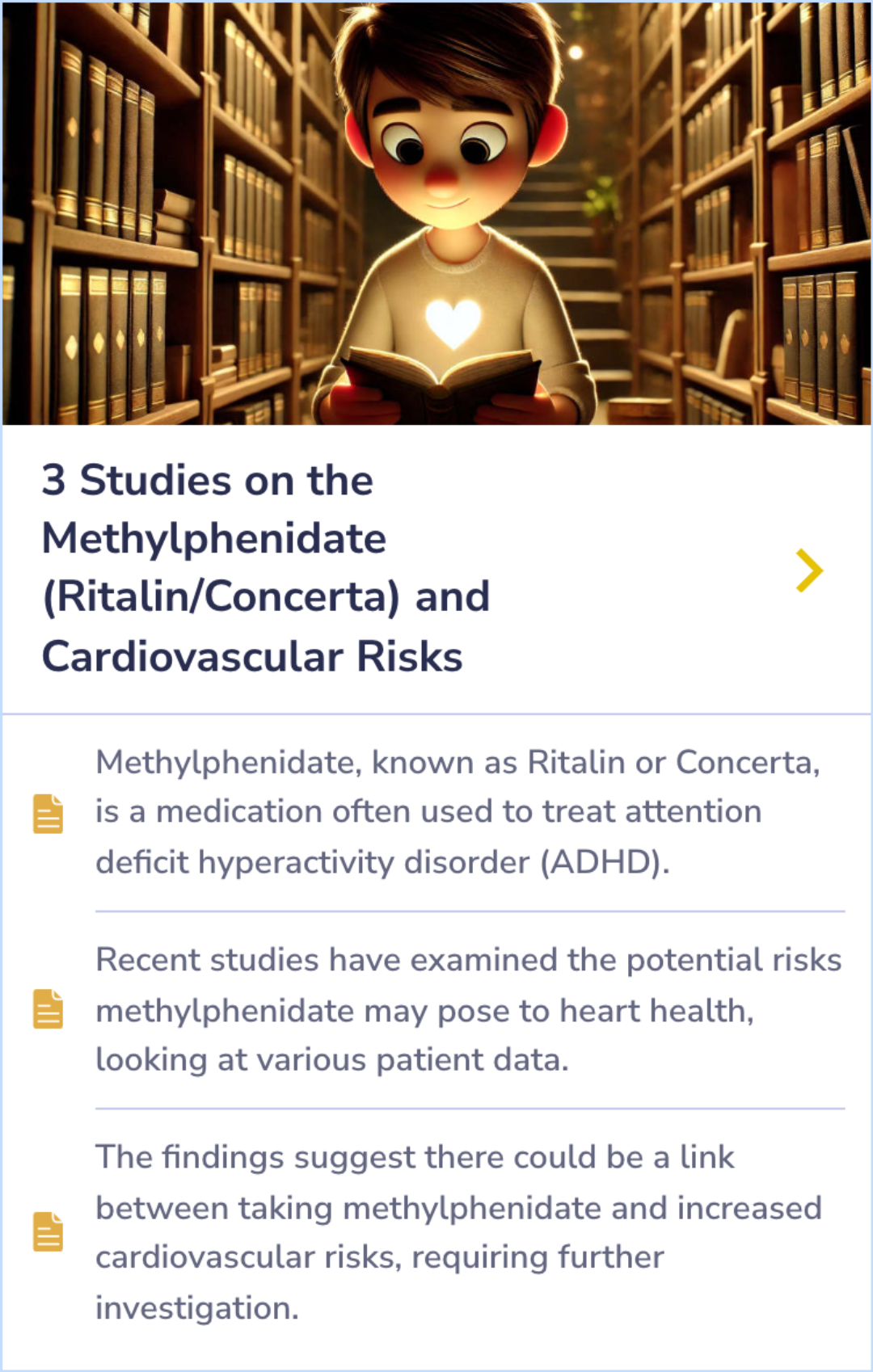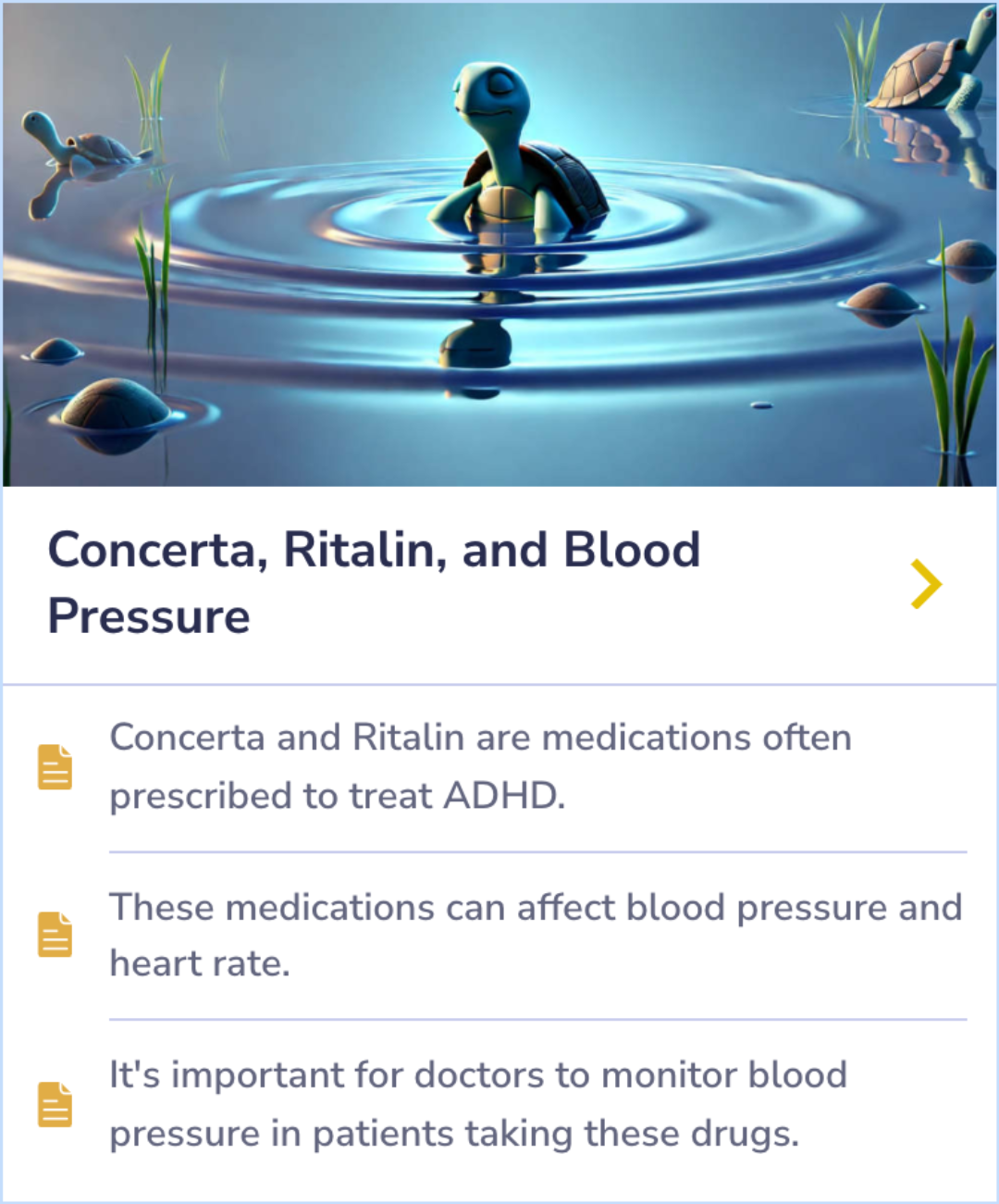Generalized Anxiety Disorder Papers
Visual Abstract
Cardiovascular effects of methylphenidate in humans are associated with increases of dopamine in brain and of epinephrine in plasma
Cardiovascular Effects of Methylphenidate and Dopamine
November 25, 2024
author
Volkow ND, Wang GJ, Fowler JS, Molina PE, Logan J, Gatley SJ, Gifford A, Ding YS, Wong C, Pappas NR, Zhu W, Swanson JM
journal
Psychopharmacology
Date Published
Mar 2003
Why link to a visual abstract?
What is a visual abstract?
Original
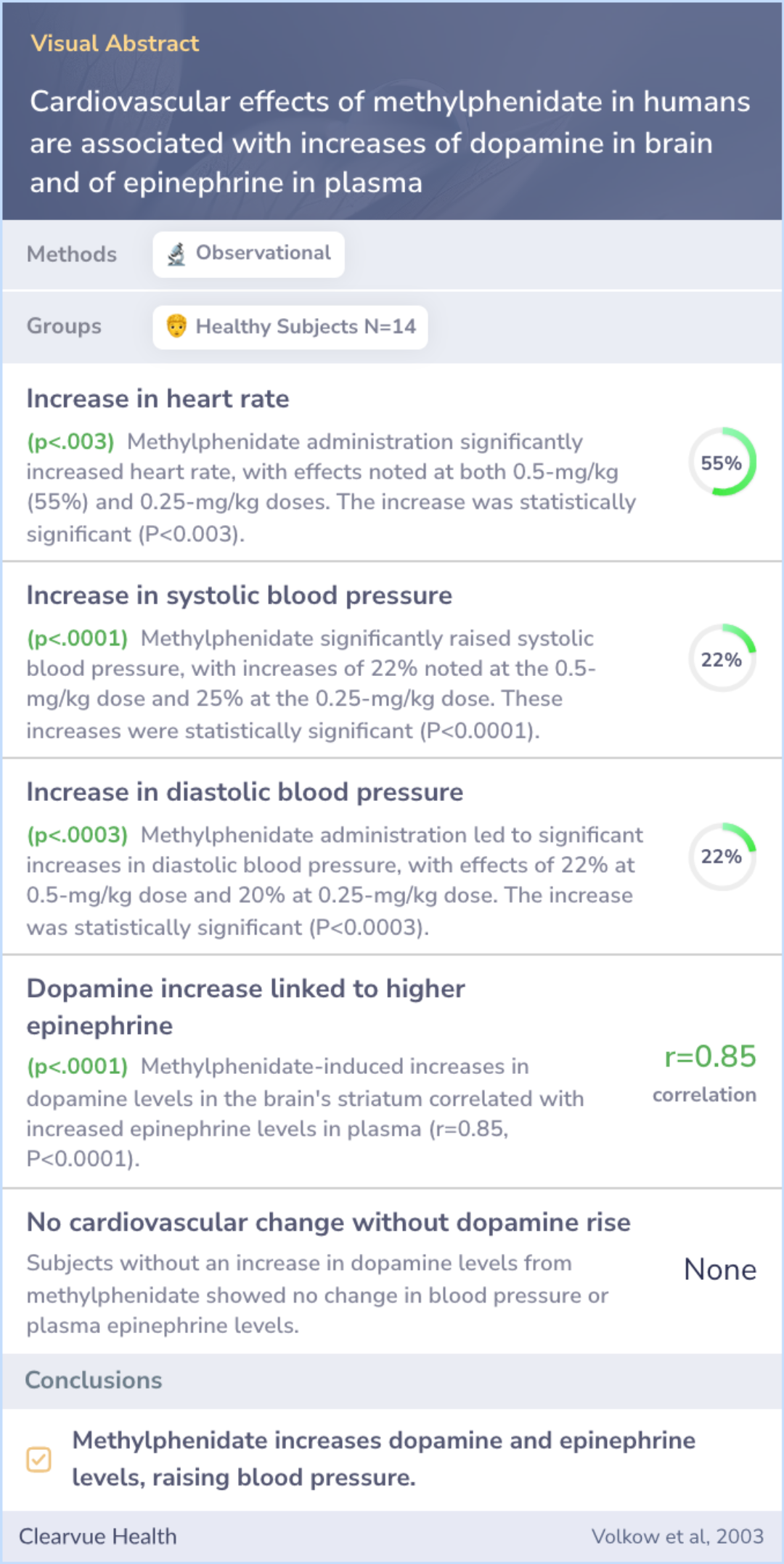
Study Summary
🔬
What They Studied
The study aimed to understand how methylphenidate (Ritalin) affects cardiovascular functions through dopamine and epinephrine levels.
💡
What They Found
They found that methylphenidate (Ritalin) increases both dopamine in the brain and epinephrine levels in the blood, leading to higher heart rates and blood pressure.
📚
What This Means
These findings indicate that methylphenidate's (Ritalin) rise in blood pressure is partly due to its influence on dopamine and epinephrine, aligning with known cardiovascular risks associated with its use.
Study Summary
Study Overview
Abstract: background
The cardiovascular effects of psychostimulant drugs (methylphenidate, amphetamine, cocaine) have been mostly associated with their noradrenergic effects. However, there is some evidence that dopaminergic effects are involved in the cardiovascular act...more

Study Summary
Methods
Researchers used a technique called PET scans to take pictures of the brain after giving 14 healthy people different doses of methylphenidate (Ritalin) through an IV. They wanted to see how this drug affected the dopamine levels in their brains. At the same time, they checked the participants' heart rate and blood pressure.
By measuring these factors alongside dopamine changes, they aimed to uncover patterns between the brain's reactions and cardiovascular responses. They also measured chemicals in the blood, like adrenaline (epinephrine) and noradrenaline (norepinephrine), to see if they changed as well.
By measuring these factors alongside dopamine changes, they aimed to uncover patterns between the brain's reactions and cardiovascular responses. They also measured chemicals in the blood, like adrenaline (epinephrine) and noradrenaline (norepinephrine), to see if they changed as well.
Abstract: methods
Positron emission tomography (PET) and [(11)C]raclopride, a dopamine (DA) D2 receptor radioligand that competes with endogenous DA for occupancy of the D2 receptors, were used to measure changes in brain DA after different doses of intravenous methyl...more

Study Summary
Results
When people took methylphenidate (Ritalin), their heart rates and blood pressures went up, as well as adrenaline (epinephrine) levels in their blood. These heart and blood pressure changes seemed connected to increases in dopamine in a part of the brain called the striatum. When dopamine went up, so did adrenaline (epinephrine), showing a strong link between them.
For people whose dopamine didn't increase after taking the drug, there were no changes in their blood pressure or adrenaline (epinephrine). This suggests that the increase in blood pressure might be partly due to changes in dopamine levels.
For people whose dopamine didn't increase after taking the drug, there were no changes in their blood pressure or adrenaline (epinephrine). This suggests that the increase in blood pressure might be partly due to changes in dopamine levels.
Abstract: results
Methylphenidate administration significantly increased heart rate, systolic and diastolic blood pressures and epinephrine concentration in plasma. The increases in blood pressure were significantly correlated with methylphenidate-induced increases of...more
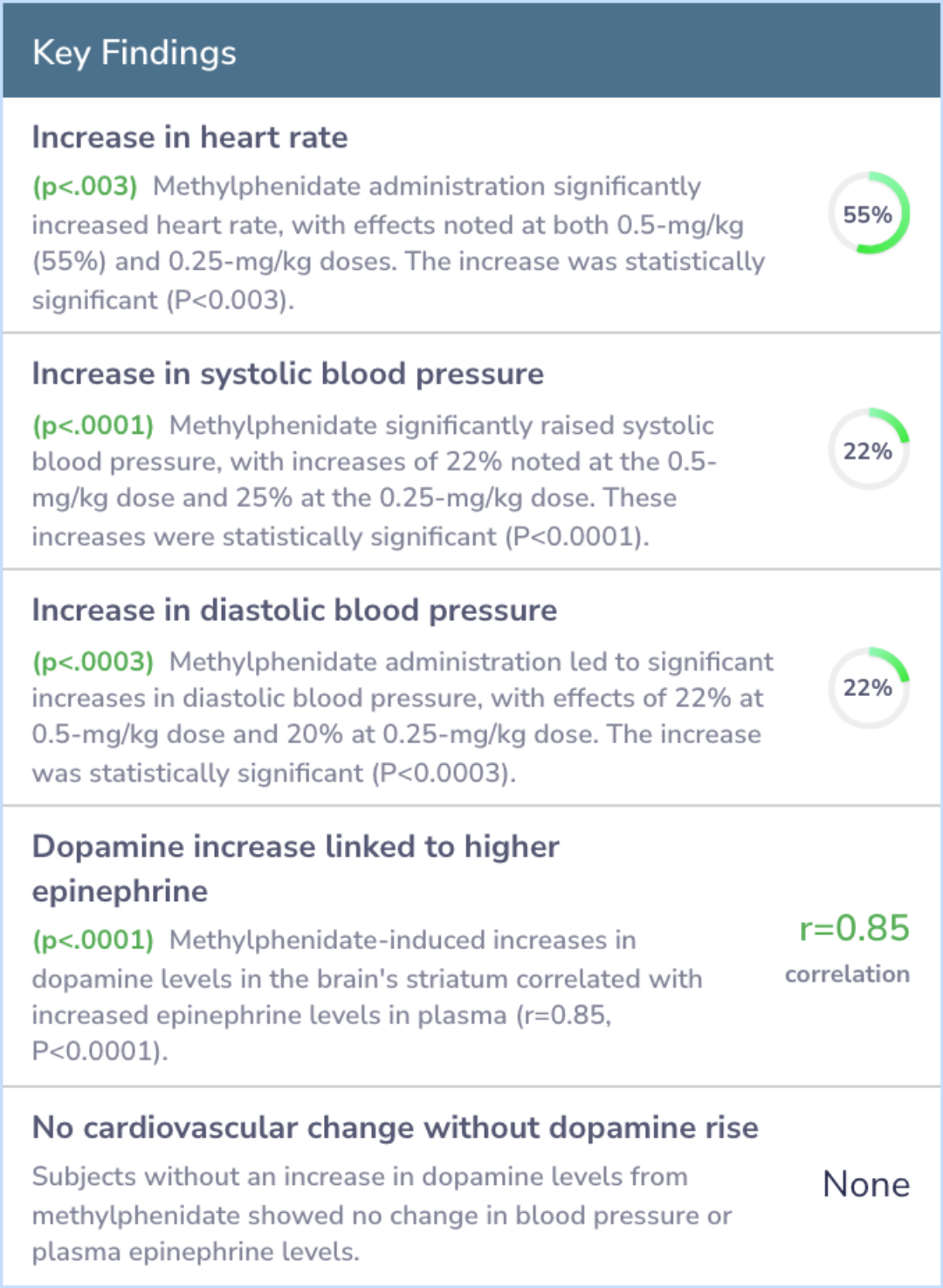
Study Summary
Conclusions
The findings indicate that when dopamine levels increase due to methylphenidate, blood pressure also rises. This suggests that dopamine, which is usually associated with pleasure and reward in the brain, might also affect how methylphenidate influences blood pressure.
The study hints that the drug's impact on blood pressure might be related to how dopamine triggers the release of adrenaline. Therefore, understanding dopamine’s role could improve insights into how these medications work on the cardiovascular system.
The study hints that the drug's impact on blood pressure might be related to how dopamine triggers the release of adrenaline. Therefore, understanding dopamine’s role could improve insights into how these medications work on the cardiovascular system.
Abstract: conclusions
These results are consistent with the hypothesis that methylphenidate-induced increases in blood pressure are in part due to its central dopaminergic effects. They also suggest that methylphenidate's pressor effects may be in part mediated by DA-indu...more
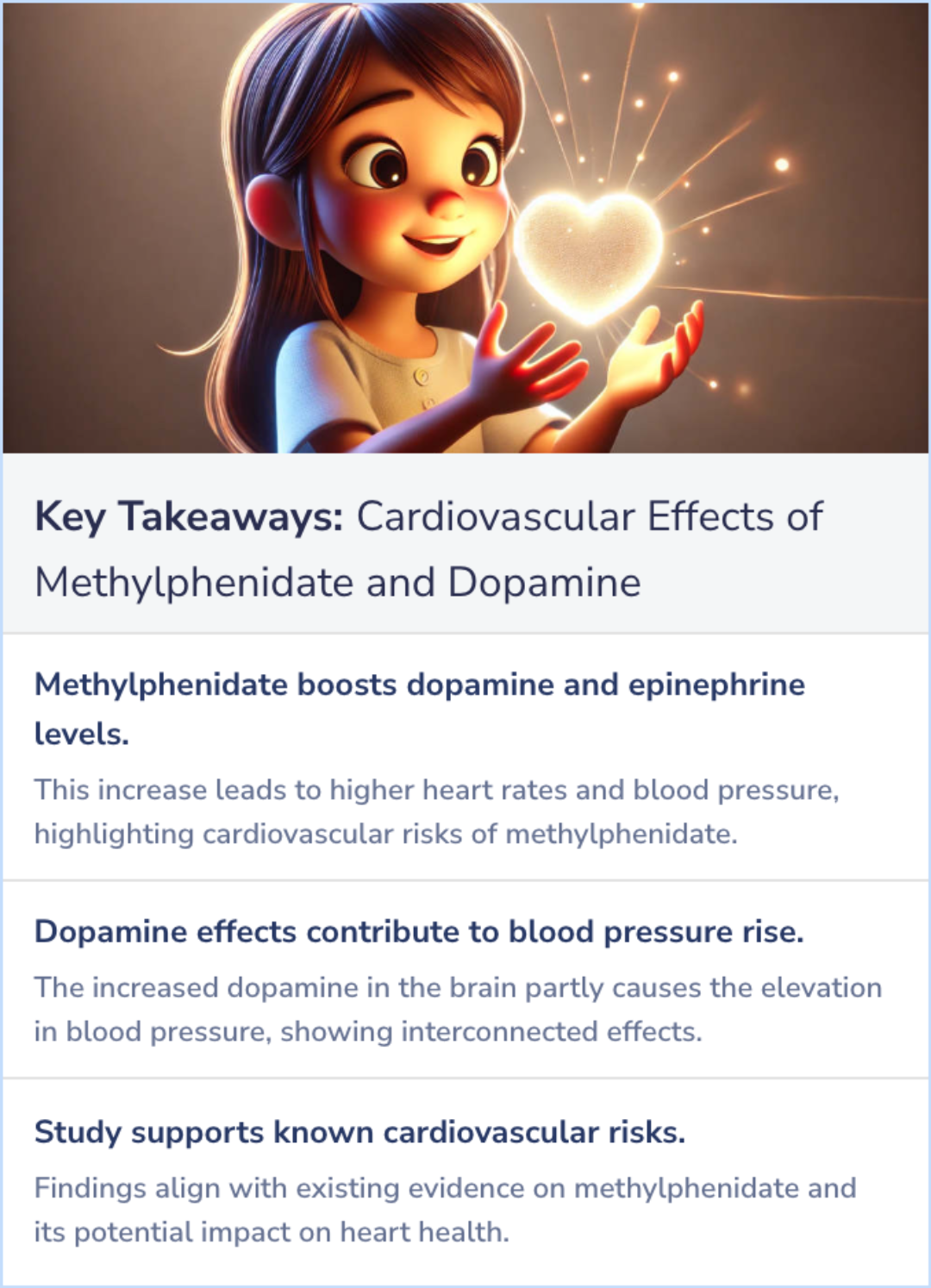
Background Information
Patient Guide
🧠
Methylphenidate's Mechanism of Action
Blocks norepinephrine and dopamine reuptake, boosting concentrations in the synaptic cleft.
❤️
Cardiovascular Concerns
May exacerbate heart-related symptoms like palpitations; caution advised for heart conditions.
👀
Monitoring Cardiovascular Side Effects
Essential monitoring for side effects such as cardiovascular issues due to potential risks.
👨⚕️
Primary Clinical Uses
FDA-approved for ADHD and second-line treatment for narcolepsy in children and adults.
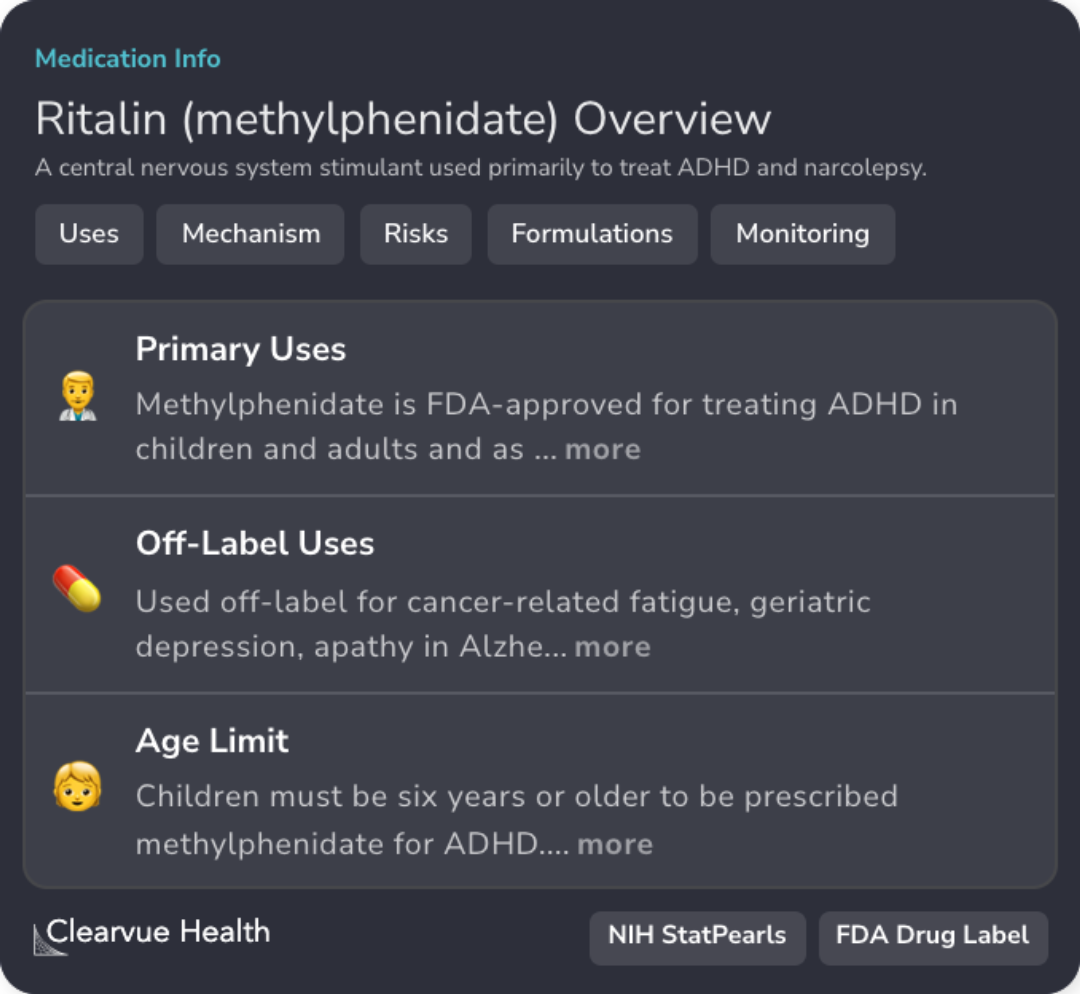
Evidence Summary
Comparing Cardiac Safety of ADHD Stimulants in Youth
This study tracked over two million children with ADHD to compare cardiac event risks between two common stimulant medications. Using data from Medicaid, researchers followed young users of methylphenidate and amphetamine salts to monitor emergency room visits for heart-related symptoms.
After accounting for health history, the findings showed that current users of either stimulant had no higher risk for cardiac issues than past users, indicating similar safety profiles for these medications.
After accounting for health history, the findings showed that current users of either stimulant had no higher risk for cardiac issues than past users, indicating similar safety profiles for these medications.
Evidence Summary
Exploring Heart Health Risks with Methylphenidate
Recent studies are exploring the potential cardiovascular risks associated with methylphenidate, a medication commonly used to treat ADHD. Data from these studies indicate there might be a connection between methylphenidate use and increased risks to heart health.
Methylphenidate, known by brand names like Ritalin and Concerta, is undergoing closer scrutiny as researchers analyze patient data to uncover whether there’s a significant impact on heart rate, blood pressure, and other cardiovascular markers.
Ongoing investigations aim to clarify how methylphenidate affects the heart, especially considering its influence on dopamine and related neurotransmitters.
Methylphenidate, known by brand names like Ritalin and Concerta, is undergoing closer scrutiny as researchers analyze patient data to uncover whether there’s a significant impact on heart rate, blood pressure, and other cardiovascular markers.
Ongoing investigations aim to clarify how methylphenidate affects the heart, especially considering its influence on dopamine and related neurotransmitters.
Evidence Summary
Monitoring Heart Health with ADHD Medications
Concerta and Ritalin, two commonly prescribed ADHD medications, can impact heart rate and blood pressure. Patients taking these drugs need regular check-ups to track any cardiovascular changes.
Doctors monitoring patients on these treatments can help manage any potential effects on blood pressure, ensuring safe, effective treatment.
This helps align with research on how these medications might influence cardiovascular functions.
Doctors monitoring patients on these treatments can help manage any potential effects on blood pressure, ensuring safe, effective treatment.
This helps align with research on how these medications might influence cardiovascular functions.
